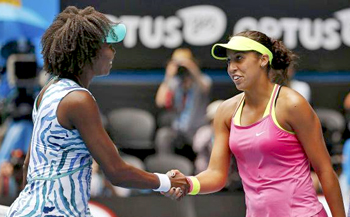
Melbourne, Jan 28: American teenager Madison Keys overcame a left thigh injury to beat Venus Williams 6-3, 4-6, 6-4 at the Australian Open on Wednesday, ensuring there would be no Williams sisters semifinal.
The 19-year-old Keys will play either Serena Williams or last year’s finalist, Dominika Cibulkova, in Thursday’s semifinal. The Williams sisters last met in a Grand Slam match at Wimbledon in 2009, when Serena won the final.
The semifinalists from the other half of the women’s draw have already been determined No. 2 Maria Sharapova will play No. 10-seeded Ekaterina Makarova on Thursday.
Keys received treatment on her leg after dropping serve in the second set to give Venus Williams a 4-1 lead. After the medical timeout, she came back to break Williams’ serve twice to level the set at 4-all, but Williams then broke her next service game and served out the set, sending it to a decider.
Keys was also behind 3-1 in the final set before breaking Williams’ serve three times in a row to close out the match.
The match featured 12 service breaks, seven won by Keys, and 83 combined unforced errors. Williams had only 10 winners to go with her 38 unforced errors; Keys had 34 winners and 45 unforced errors.
The loss ended an encouraging 10 days for Venus Williams at Melbourne Park. She hadn’t advanced to the quarterfinals of a Grand Slam since the U.S. Open in 2010 and had struggled to recapture her earlier form after being diagnosed with Sjogren’s syndrome, an auto-immune disease that causes fatigue and joint pain.
But Williams is already 9-1 to start the new year after capturing her season-opening tournament in Auckland, New Zealand, before the Australian Open.
“It already feels like a long season already, so many matches in a row,” Williams said. “But it’s a great start. Hopefully I’ll be able to keep this level up.”
Regardless of the quality of the error-strewn match, Keys was pleased to be through to the semis.
“It’s amazing, you just have to embrace the moment,” said Keys, who is now coached by former three-time major winner Lindsay Davenport. “And I get to enjoy another moment next round.”
Keys said the injury was the same one that forced her to retire from her third-round match last year at Wimbledon.
“It was definitely one of those things where it wasn’t nearly as bad as Wimbledon, but it was that nightmare of ‘I don’t want this to happen again,’” she said. “Luckily the pain meds kicked in.”
Two men’s quarterfinals were scheduled later Wednesday defending champion Stan Wawrinka against Kei Nishikori, and No. 1 Novak Djokovic against Milos Raonic in a night match.
Andy Murray and Tomas Berdych are already through to the semis on the other side of the men’s draw.





Comments
Add new comment